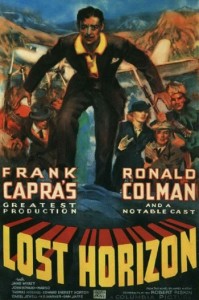 Frank Capra, the most influential director of the Depression era, who won the Oscar in 1934 for “It Happened One Night,” followed up his 1936 political fable “Mr. Dees Goes to Town” with a totally different fare, “Lost Horizon,” a fantasy-adventure scripted by his favorite scribe Robert Riskin, based on the popular novel by James Hilton.
Frank Capra, the most influential director of the Depression era, who won the Oscar in 1934 for “It Happened One Night,” followed up his 1936 political fable “Mr. Dees Goes to Town” with a totally different fare, “Lost Horizon,” a fantasy-adventure scripted by his favorite scribe Robert Riskin, based on the popular novel by James Hilton.
The eloquent British actor Ronald Colman plays Robert Conway, a gallant British diplomat and historian who comes to the rescue of refugees from the Chinese revolution. The diverse group includes Conway’s younger, immature brother George (John Howard), swindler on the run Henry Barnard (Thomas Mitchell), sickly prostitute Gloria Stone (Isabel Jewell), and fussy scientist Alexander P. Lovett (Edward Everett Horton).
En route, the plane climbs into the snow-covered Himalayas and then Tibet, described as “the roof of the world, while the passengers realize that the pilot is actually an Asian. After the plane crashes, the survivors are greeted by a stunning, snowless place, the Valley of the Blue Moon, overseeing the majestic landscapes of Shangri-La. In their new locale, the outsiders discovers the beauty and tranquility of a vastly different world, devoid of all the illnesses of capitalism, competition, greed, materialism, war, hatred and crime.
The gorgeous sets, which were constructed by art designer Stephen Goosson, were considered to be the largest, most elaborate in Hollywood’s history to date. A major production for the Depression era, initially the film ran much longer than two hours and was cut by Columbia to 118 minutes; a longer version of 138 minutes was later re-released theatrically.
Cast
Robert Conway (Ronald Colman)
Sondra (Jane Wyatt)
Alexander P. Lovett (Edward Everett Horton)
George Conway (John Howard)
Henry Barnard (Thomas Mitchell)
Maria (Margo)
Georia Stone (Isabel Jewell)
Chang (H.B. Warner)
High Lama (Sam Jaffe)
Lord Gainsford (Hugh Buckler)
Oscar Nominations: 6
Best Picture, produced by Frank Capra
Assistant Director: C.C. Coleman
Supporting Actor: H. B. Warner
Interior Decoration: Stephen Gooson
Sound Recording: John Livadary
Score: Dimitri Tiomkin
Film Editing: Gene Havlick and Gene Milford
Oscar Awards: 2
Interior Decoration
Film Editing
Oscar Context
In 1937, nine other movies competed with “Lost Horizon” for Best Picture, including Warner biopic, “The Life of Emile Zola,” which won, Leo McCarey’s marital comedy “The Awful Truth” with six nominations, and Gregory La Cava’s backstage drama, “Stage Door,” with four. The other nominees were: William Wyler’s social drama set in a New York City slum, “Dead End,” and Henry King’s adventure “In Old Chicago,” The first version of “A Star Is Born,” “The Good Earth,” “In Old Chicago,” and the Deana Durbin vehicle, “One Hundred Men and a Girl.”
Next to “The Life of Emile Zola,” which received 10 nods, the most-nominated films were Fox’s adventure “In Old Chicago” and “A Star Is Born.” Only one of the ten nominated pictures was a comedy, Leo McCarey’s sublime screwball, “The Awful Truth,” co-starring Cary Grant and Irene Dunne at their very best.
The Oscars were spread among eight films; the only two pictures that didn’t win any award were “Dead End” and “Stage Door.”
“Lost Horizon” lost the Supporting Actor Oscar to Joseph Schildkraut in “Life of Emile Zola,” Sound to Thomas Mouton for “The Hurricane,” Assistant Director to Robert Webb for “In Old Chicago,” and Score to Andre Previn for Fox’s “One Hundred Men and a Girl.”










